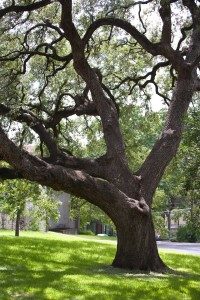
At Seminary of the Southwest one of our core values is rootedness. For me as a professor of church history, this means ensuring that my students have a firm grounding in the Christian tradition. I often say that I do not want to make my students into historians like me. (There are already enough of us with history PhDs running around!) But I do want my students to become competent communicators of the Christian tradition in whatever ministry context they find themselves. And in particular, I want students at Seminary of the Southwest to be especially competent about communicating what it means to be Episcopalian and part of the Anglican tradition.
One of the big issues facing Episcopalians today is authority. Who are we as a church and who leads us in this church? At General Convention proposals for restructuring parts of the church have been part of the resolutions presented by the TREC task force. These proposals include creating a unicameral convention (no separate Houses of Bishops and Deputies), further elevating the Presiding Bishop as the primate of the Episcopal Church, and clarifying the roles of the President of the House of Deputies and the Executive Council. However these decisions are made, the choices concerning them inform how we understand the exercise of authority in the church.
Although TREC seems to be very much of the moment, it was a frequent point of reference in the English Reformation course I taught this past spring. In this class, mostly made up of seniors, my students grappled with how the Episcopal Church they knew today found its origins in messy family politics, religious change imposed from above, and formative events that seemed to be more about power than piety. Students recognized that the shared governance among bishops, clergy and laity that exists in the Episcopal Church is both distinct from but also has echoes of a sixteenth-century church ruled by a monarch intersecting with the authority of bishops, parliaments, and convocations. As we worked through the complex landscape of the English Reformation, the class came to see how profoundly the varying reigns of the Tudor monarchs each introduced different types of change. Henry’s reforms were not Edward’s, and likewise Mary was every much of a Catholic reformer as Elizabeth was a Protestant one.
I often ended classes asking my students how they would translate what they learned in class to contexts in their future ministries. One of the things my students realized was that the current Episcopal Church is experiencing fundamental changes. Iconoclasm and executions are not the order of the day; but in its own ways TREC and other developments, such as the memorial to the church “Episcopal Resurrection,” are asking the church to reform itself. One of my students even devised a final project that compared the new views of authority in the English Reformation with the emerging views of authority in the TREC documents.
Out of all this work my students became more deeply rooted in the Anglican tradition. They discovered a living entity, one that both is recognizable over time but that also adapts to its context. And by becoming rooted in the tradition they were also becoming those competent communicators that I hoped they would.
We are indeed in changing times in this church. But if we remain rooted in what is most authentic and vital to it, we can also continue to thrive as a church dedicated to Christ’s work of reconciliation and discipleship.
How have you experienced being rooted in the life and traditions of the Episcopal Church? What about them do you find most energizing or life-giving?
Dr. Joslyn-Siemiatkoski (@danjoslynsiem) joined the seminary faculty in Fall 2014 following his tenure since 2005 on the faculty at Church Divinity School of the Pacific in Berkeley, California. His areas of interest include Jewish-Christian history, the history of Anglican ecclesiology, and contemporary interfaith dialogue.

